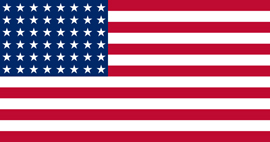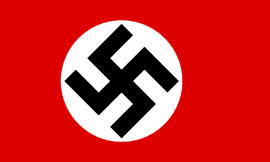 Back when he was coming up there were a half-dozen good daily and afternoon newspapers in Chicago and the competition was brutal. The crime mobs were the big story in those days and a reporter had to be resourceful to stay ahead of the pack. The chumps played loose with the facts to sell papers but the creative types like Endicott were better at working the angles. It may have taken breaking into a murder victim’s apartment to rummage through a diary, impersonating a detective at a crime scene or getting chummy with the precinct cops so that you could sit in on interrogations… Endicott had done it all. What he wouldn’t do was go on the take with the rackets or the corrupt politicians, which ruffled some feathers. A couple of bricks through his windows and a set of slashed tires got his attention, but when a bullet drilled a hole through his hat while he was covering a story, Endicott decided to beat it to take a foreign job with Hearst International News.
Back when he was coming up there were a half-dozen good daily and afternoon newspapers in Chicago and the competition was brutal. The crime mobs were the big story in those days and a reporter had to be resourceful to stay ahead of the pack. The chumps played loose with the facts to sell papers but the creative types like Endicott were better at working the angles. It may have taken breaking into a murder victim’s apartment to rummage through a diary, impersonating a detective at a crime scene or getting chummy with the precinct cops so that you could sit in on interrogations… Endicott had done it all. What he wouldn’t do was go on the take with the rackets or the corrupt politicians, which ruffled some feathers. A couple of bricks through his windows and a set of slashed tires got his attention, but when a bullet drilled a hole through his hat while he was covering a story, Endicott decided to beat it to take a foreign job with Hearst International News.
 From the first time his father had told him about being hired by Parisian Société Électrique Edison to work on the construction of the little steam power plant on Vlhká Street in Brno, Tomáš Kopecky had wanted to be an engineer. The four large dynamos had been sent from New York City and they mesmerized the young Kopecky after he had been successful in badgering his father to get permission for a visit. The electricity from that plant went a short ways to what was then called the Deutsches Stadttheater. The city was called Brünn back then too under Austrian rule. When that opera theater opened in 1882 people said it was the first public building in the world to have electric lights. Although Thomas Edison had designed the plans, it wasn’t until 1911 that the inventor came to the city to see the installation in person, and the boy managed to be there to meet the man. Then the Great War changed everything, and in the aftermath Kopecky grew fascinated with the machines of war and how to employ them. In the early years of the First Republic he set his sights on the Československé armády and the military academy at Hranice.
From the first time his father had told him about being hired by Parisian Société Électrique Edison to work on the construction of the little steam power plant on Vlhká Street in Brno, Tomáš Kopecky had wanted to be an engineer. The four large dynamos had been sent from New York City and they mesmerized the young Kopecky after he had been successful in badgering his father to get permission for a visit. The electricity from that plant went a short ways to what was then called the Deutsches Stadttheater. The city was called Brünn back then too under Austrian rule. When that opera theater opened in 1882 people said it was the first public building in the world to have electric lights. Although Thomas Edison had designed the plans, it wasn’t until 1911 that the inventor came to the city to see the installation in person, and the boy managed to be there to meet the man. Then the Great War changed everything, and in the aftermath Kopecky grew fascinated with the machines of war and how to employ them. In the early years of the First Republic he set his sights on the Československé armády and the military academy at Hranice.
 Once she was a lieutenant in the Signal Corps, heeding a plea from General Pershing for volunteers who spoke French to sign up and go to the front lines to handle communications during the Great War, which almost got Bess Flynn killed. When she came home the Army said her and the other women volunteers weren’t veterans. The Army did not swear in women was the lame argument of the bureaucrats. As she remembered it sure looked like an army officer who swore her in. Perhaps those really had not been lieutenant’s bars on her collar. Now Bess was a little older and a little grayer but she still carried the fire from those days while running the teletype section at the U.S. Embassy in Prague.
Once she was a lieutenant in the Signal Corps, heeding a plea from General Pershing for volunteers who spoke French to sign up and go to the front lines to handle communications during the Great War, which almost got Bess Flynn killed. When she came home the Army said her and the other women volunteers weren’t veterans. The Army did not swear in women was the lame argument of the bureaucrats. As she remembered it sure looked like an army officer who swore her in. Perhaps those really had not been lieutenant’s bars on her collar. Now Bess was a little older and a little grayer but she still carried the fire from those days while running the teletype section at the U.S. Embassy in Prague.
 He should have left from St. Nazaire for Pennsylvania and home in 1919 after serving his time in the American Expeditionary Forces. Clarence Morel had a job waiting for him on a newspaper back in Harrisburg and no prospects for work in France. But he could not get Paris out of his head and ended up quitting his job, upsetting his family, and remaining in France with no prospects and little money in his pocket. Providence – says a French proverb – takes care of infants and fools. But six weeks later Morel had a job as a stringer for United Press and found himself married after eight months. He had no quarrel with his country, and there were times Morel yearned for a plate of blueberry hotcakes, yet he loved the way the French had mastered the art of living and enjoying life. Barring semi-annual visits home to the States, Morel was happy as an expatriate and had made a name for himself as one of the chief correspondents in the Consolidated News Service’s Paris bureau.
He should have left from St. Nazaire for Pennsylvania and home in 1919 after serving his time in the American Expeditionary Forces. Clarence Morel had a job waiting for him on a newspaper back in Harrisburg and no prospects for work in France. But he could not get Paris out of his head and ended up quitting his job, upsetting his family, and remaining in France with no prospects and little money in his pocket. Providence – says a French proverb – takes care of infants and fools. But six weeks later Morel had a job as a stringer for United Press and found himself married after eight months. He had no quarrel with his country, and there were times Morel yearned for a plate of blueberry hotcakes, yet he loved the way the French had mastered the art of living and enjoying life. Barring semi-annual visits home to the States, Morel was happy as an expatriate and had made a name for himself as one of the chief correspondents in the Consolidated News Service’s Paris bureau.
 Working for Harry Lasky had not been in the cards. Des Turner’s friends still could not fathom why he had left a stable career at the Cleveland Press. Part of the reason was the paper was losing some of its old muckraking edge, but there were other issues nagging at him. Des had been a damn good reporter in his day, and he was a top notch re-write man. The problem was there were a couple of other quality pros ahead of him on the way to the city editor’s chair and Des did not feel like waiting in line. So he quit the Press and headed east to visit old chums in New York City while figuring out what to do next. One night out with a group having a bang up time at the Hickory House some impertinent twerp barged right in and interrupted the party. Turns out the twerp was Lasky and he point blank offered Des the job of managing his worldwide news operation… and for respectable cash. Des found out later that the owner of the Consolidated News Service was no stranger to the city’s popular clubs, and made a point of knowing who in the business was out on the town. His pals warned Des that Lasky was a cheap, crazy bastard who was desperate to fill the job because no one in their right mind would touch it. In a strange way that sounded like job security to Des, who appreciated a dose of anarchy. Besides, on first impressions, Lasky was nothing he couldn’t handle.
Working for Harry Lasky had not been in the cards. Des Turner’s friends still could not fathom why he had left a stable career at the Cleveland Press. Part of the reason was the paper was losing some of its old muckraking edge, but there were other issues nagging at him. Des had been a damn good reporter in his day, and he was a top notch re-write man. The problem was there were a couple of other quality pros ahead of him on the way to the city editor’s chair and Des did not feel like waiting in line. So he quit the Press and headed east to visit old chums in New York City while figuring out what to do next. One night out with a group having a bang up time at the Hickory House some impertinent twerp barged right in and interrupted the party. Turns out the twerp was Lasky and he point blank offered Des the job of managing his worldwide news operation… and for respectable cash. Des found out later that the owner of the Consolidated News Service was no stranger to the city’s popular clubs, and made a point of knowing who in the business was out on the town. His pals warned Des that Lasky was a cheap, crazy bastard who was desperate to fill the job because no one in their right mind would touch it. In a strange way that sounded like job security to Des, who appreciated a dose of anarchy. Besides, on first impressions, Lasky was nothing he couldn’t handle.
 All Oskar Platen ever wanted was a good job out of the limelight with a steady paycheck. After the twins came the bills were high and there was never enough money. In the middle of the depression many said Platen was the lucky one with a safe Interior Ministry job in Berlin. Yet the pay was a pittance and his wife deserved more. The 1,000 Reichsmark loan he secured would give them breathing space, yet it came with an unexpected codicil from his new lenders, which would put the unassuming clerk in more danger than he ever dared to imagine.
All Oskar Platen ever wanted was a good job out of the limelight with a steady paycheck. After the twins came the bills were high and there was never enough money. In the middle of the depression many said Platen was the lucky one with a safe Interior Ministry job in Berlin. Yet the pay was a pittance and his wife deserved more. The 1,000 Reichsmark loan he secured would give them breathing space, yet it came with an unexpected codicil from his new lenders, which would put the unassuming clerk in more danger than he ever dared to imagine.
